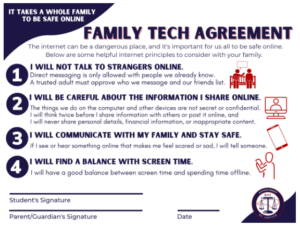
(NC Health News – Jennifer Fernandez) — As teens spend more time on social media, parents need to watch for signs that they are being exploited, North Carolina officials warn.
Between 2021 and 2022, the FBI saw a 600 percent increase in “sextortion” cases in North Carolina, state Attorney General Josh Stein said in a recent webinar. In sextortion cases, a criminal threatens to expose or publish sexual content of the victim if the victim doesn’t provide more sexual imagery, meet in person for sex or pay the extortioner with money or gift cards.
In October, the FBI issued a warning about an increase in financially motivated sextortion schemes online in the U.S. In these cases, victims are typically males aged 14 to 17, with some as young as 10. Girls are more often extorted for more compromising photos or to meet for sex. Boys have been targeted increasingly as a way to get money, federal authorities said.
Offenders contact victims through online gaming, gaming consoles, live streaming or video platforms, instant messaging apps and social media.
“Several young people have taken their own life (sic) based on the feelings of fear and shame that result from sextortion and subsequent financial targeting,” Donald Alway, the assistant director in charge of the FBI’s Los Angeles Field Office, said in a news release.
Tips for kids to stay safe online
- Chat only with known friends. Block or ignore messages from strangers.
- Realize that “chat is flat,” meaning there’s often no context, you can’t hear inflection in voices, and you should seek clarification if you’re not sure about something.
- Chat carefully without full trust at first. For example, if you think the person is someone you know, ask questions that can only be answered by that person. Videos and photos are not proof that a person is who they claim to be.
- Realize that chats and media are saved, shared and reviewed. Snapchat messages, for example, can be retrieved even though the main premise of the app is that everything gets deleted.
- Realize that everyone online puts on a persona.
- Limit what you share online, especially personal information. Predators learn details about victims through open social media accounts. Don’t share passwords.
- Be suspicious if someone you meet while playing a video game or through another online forum suggests changing to a different app or other method to communicate.
- Encourage children to report suspicious behavior to a trusted adult.
Source: State Bureau of Investigation, FBI
Growing concern
Last year, the National Center for Missing and Exploited Children’s CyberTipline received more than 32 million reports of suspected child sexual exploitation.
Child pornography makes up the vast majority of reports. The next largest category is enticement, which includes sextortion. That category grew by 82 percent from 2021 to 2022, mostly due to a spike in financial sextortion, according to the center’s annual report.
In North Carolina, tips to the state about cyber child exploitation more than tripled from 2019 to 2022 and are on track to grow higher this year, according to N.C. State Bureau of Investigation Special Agent Kevin Roughton, commander of the state’s Internet Crimes Against Children Task Force.
The state received 4,930 cyber tips in 2019. The number of tips is expected to top 26,000 this year, he said during the latest “Protecting the Next Generation of North Carolinians” webinar, which focused on online crimes against children.
“Tips have continued to go up month over month, year over year,” Roughton said. “So this is a problem that is not going away. It is only increasing.”
Shifting landscape
The social media landscape is constantly shifting, especially among teens who tend to be more open to trying new technologies.
YouTube led, with 95 percent of teens 13 to 17 saying they have used the app or site. TikTok followed at 67 percent, with Instagram (62 percent) and Snapchat (59 percent) rounding out the leaders.
The FBI said sextortion schemes happen in online environments where young people feel most comfortable.
In a recent North Carolina case, the defendant was accused of using Snapchat and Instagram to solicit a 15-year-old girl, said Boz Zellinger, special deputy attorney general for special prosecutions with the N.C. Department of Justice.
“Know what’s out there on your kids’ phones and what they’re using,” he said during the “Protecting the Next Generation” webinar.
Not just stranger danger
More than half of U.S. teenagers (51 percent) say they spend at least four hours every day on social media, according to a Gallup survey conducted earlier this year.
While not every online interaction results in exploitation, at least 15.6 percent of young adults in the U.S. have experienced at least one type of sexual abuse online before the age of 18, according to a 2022 report published in JAMA Network Open.
The surge in financial sextortion cases has tended to involve predators from outside the U.S. targeting teens here, according to the FBI. However, that is not the case for most other types of online sexual exploitation of children.
“The prevailing image of online sexual abuse is that it mostly involves stranger predators who stalk kids with technology,” co-author David Finkelhor, professor of sociology and director of the Crimes against Children Research Center at the University of New Hampshire, said in a news release. “But the reality is very diverse.”

Finkelhor and his co-authors said that professionals planning prevention and intervention strategies for online sexual abuse should understand that online abuse is often an extension of dating abuse, sexual bullying and sexual harassment. In many cases, perpetrators are not strangers; they also aren’t all adults. They can be peers or somewhat older young adult friends.
They can also be trusted community members, such as teachers, coaches and even mall Santas, Zellinger said.
“These folks that abuse children online can come from every walk of life,” he said.
Roughton warned of a misconception that predators are lurking on the “dark web.” They are on the platforms children use every day, he said.
Of the cyber tips received in North Carolina last year, 56 percent came from four sources — Facebook, Google, Instagram and Snapchat, he said.
“Our children need to understand what these dangers are and how they can protect themselves,” Roughton said.
If You Are a Victim:
- Do not comply with the predator’s demands. They may still publish the material
- Block them
- Don’t delete any affected profiles or messages, which can be used as evidence and help authorities locate and stop the predator
- Report their account to the platform(s). (Find information on how to do that at www.missingkids.org/IsYourExplicitContentOutThere or go to cybertipline.org to make a report.)
- Call your local FBI field office or 800-225-5324, or make a report at tips.fbi.gov.
- Children who need to speak to someone can get help through multiple channels:
- Email [email protected] or call 800-843-5678.
- Text HOME to 741741 to connect with a volunteer crisis counselor at the Crisis Text Line.
- Call or text 988 to reach the Suicide and Crisis Lifeline.Source: National Center for Missing and Exploited Children, FBI
